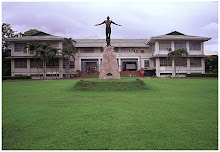Philippines: Period of Consequences
Our country is in dire peril.
The system of governance is in a meltdown, and everything that constitutes public administration is going down the drain. Our people are suffering from immense moral degradation. Our leaders are thieves and liars cloaked as congressmen and senators. And the entire Filipino system is being invaded by a lethal virus that is so severe that it might spell out our ultimate destruction, a virus that has raided the lowly barangay halls and crept slowly to the highest seat of power in our country—Malacañang.
That virus is corruption: a hydra of horrific proportions, a monster that is difficult to defeat, a problem that has no clear end.
Corruption, according to Commission on Elections Spokesman James Jimenez, arises from our innate need to get ahead of others, and this is the problem. This need to garner an edge over others is the driving force of corruption. And if we fail to tackle this problem at its roots, ultimately, we would lose this battle against corruption.
Reform is a potent tool against corruption, but how do we change the system if reform in this country is rejected in favor of the status quo? There is no easy answer to this question. We are facing the largest stumbling block in the movement for change. The indifference of the public regarding graft and corruption is despicable, to say the least. Our people have turned a blind eye to this blatant betrayal of our country. We are playing deaf amidst the calls for change. And we, as a people, are crippled in this enormous challenge of nationwide change.
But even if we face public indifference, actions that would trigger reform should push through, come hell or high water. We who are able should lead the way. We should open our eyes for those who refuse to see, and be the voice for those who cannot speak. We must stand for those who remain immobile and we must fight for the greater good of this country, even if we pay the ultimate price—death.
The Commission on Elections is well on its way to change. After the heavily rigged 2004 elections, COMELEC has been viewed as one of the most corrupt agencies of government. And as an effect, the people have lost all trust in this institution and the electoral process.
This highlighted the enormous need to change the system of our practice, of our right to suffrage. The automation of elections in the Autonomous Region of Muslim Mindanao showcased the capacity of COMELEC to reform itself. But Director Jimenez stays realistic. In an interview with him he told me that, electoral reform is but a first step to a large-scale overhaul of our system of governance. He said that a good electoral system would facilitate the victory of the candidate who received the most number of votes, but it does not mean that changes in the electoral system would ensure the victory of the best candidate.
The responsibility of voting the best candidate is vested on our shoulders. We must not relegate our right to vote at the least of our priorities. We are solely responsible to the future of this country, and the instigating factor lies with our vote.
To tackle corruption we must first look at ourselves. Are we really morally-capable to eradicate our society of corruption? Do we have the moral ascendancy to talk about reform?

We are morally incapacitated. The people have tolerated corruption for the longest time, we are slowly being eroded by this cancer. But we have been numb to the pain that corruption brings to our daily lives. This can’t go any further.
We must initiate to move. We must strengthen our institutions, and start to chant calls for change. Let us stand up to the adversities of this battle. According to former British Premier Winston Churchill, “The era of procrastination, of half-measures, of soothing and baffling expedients, of delays, is coming to a close. In its place we are entering a period of consequences.” We are indeed in a period of consequences. Poverty is in an all-time high— hunger is rampant, and degradation is in every aspect of society. We must not resort to half measures at these times of distress. We must move swiftly, cunningly, and decisively to address corruption, because if not we will be at the helm of history’s greatest national demise.
-----------------------------------------------------
* Ideas are formulated with the help of a personal interview with the COMELEC Spokesperson James Jimenez conducted last October 16, 2008. Photos above were taken in actual with self effort and were edited through Adobe Photoshop. These are not retrieved from the Internet.
Pavia, Esther Irene J.
POSC 1- B
2008-15738 (BA Communication Arts)
Prof. Bubbles Beverly Asor

